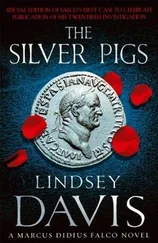Lindsey Davis - The Iron Hand of Mars
Здесь есть возможность читать онлайн «Lindsey Davis - The Iron Hand of Mars» весь текст электронной книги совершенно бесплатно (целиком полную версию без сокращений). В некоторых случаях можно слушать аудио, скачать через торрент в формате fb2 и присутствует краткое содержание. Жанр: Исторический детектив, на английском языке. Описание произведения, (предисловие) а так же отзывы посетителей доступны на портале библиотеки ЛибКат.
- Название:The Iron Hand of Mars
- Автор:
- Жанр:
- Год:неизвестен
- ISBN:нет данных
- Рейтинг книги:5 / 5. Голосов: 1
-
Избранное:Добавить в избранное
- Отзывы:
-
Ваша оценка:
- 100
- 1
- 2
- 3
- 4
- 5
The Iron Hand of Mars: краткое содержание, описание и аннотация
Предлагаем к чтению аннотацию, описание, краткое содержание или предисловие (зависит от того, что написал сам автор книги «The Iron Hand of Mars»). Если вы не нашли необходимую информацию о книге — напишите в комментариях, мы постараемся отыскать её.
The Iron Hand of Mars — читать онлайн бесплатно полную книгу (весь текст) целиком
Ниже представлен текст книги, разбитый по страницам. Система сохранения места последней прочитанной страницы, позволяет с удобством читать онлайн бесплатно книгу «The Iron Hand of Mars», без необходимости каждый раз заново искать на чём Вы остановились. Поставьте закладку, и сможете в любой момент перейти на страницу, на которой закончили чтение.
Интервал:
Закладка:
The recruits were like any group of adolescent boys: untidy, lazy, complaining and truculent. They spent all day discussing gladiators or their sex lives with an astonishing mixture of lies and ignorance. They were starting to have identities now. Lentullus was our problem baby. Lentullus couldn't do anything. Helvetius had only brought him because he wanted to come so badly, and he had a touching face. Then there was Sextus, who had worse sore feet than the rest of them, which meant they were virtually rotting in his boots. Probus, whom we reckoned would never learn to march with both legs at once. Ascanius, the town boy from Patavium, whose jokes were good but timed with utter tastelessness. The one whose country accent nobody could understand; the one who smelt; the one no one liked; the one with a big nose; the one with big privates; the one who had no personality. My mother would have said not a lad of them was safe to leave in charge of a cooking pot.
Mind you, she said that about me.
Leaving Vetera, we looked like a highly disreputable merchant's caravan emerging from the Nabataean desert after fifteen days of storms. Out of twenty, nineteen recruits had never ridden a horse for more than three miles before; the one left was Lentullus, who had never been on anything four-legged at all. They all seemed to have vaguely wandering eyes, their ears stuck out behind their cheek-guards like steering paddles on a ship, and their swords seemed too big for them. The horses, though Gallic, which should have been a good pedigree, were an even less attractive bunch.
Justinus and I rode first, looking as trim as possible. We were not helped by the tribune's little dog yapping round our horses' hooves. In the middle of the line we were keeping Dubnus on his bow-legged pony, which had a tuneless set of sheepbells stitched to its bridle. We made the pedlar muffle them, but the wadding fell out after the first mile. Helvetius rode last, struggling to keep a tight pack. We could hear him cursing with dreary consistency amidst the tonk of the pedlar's bells.
Near the pedlar rode Helvetius's servant, his treasured entitlement as a centurion. He was a mournful dot, who looked after his kit and his horse. While the rest of us kept trying to poach his services, he kept whining to Helvetius that he wanted to apply for an immediate transfer to Moesia (Moesia is a disgusting post edging the bleakest corner of the amine Sea). Justinus, in contrast, had brought no retinue, though his rank rated a large one. He said the dangers of our trip made it unfair. Eccentric lad. Fairness has never featured in the terms of employment for senators' slaves. Still, despite his pampered upbringing, Justinus managed to look after not only himself, but his dog too.
We were all armoured. Even me. I had found a quartermaster who sorted me out a corslet that fitted.
'We have plenty to spare, as a matter of fact!' A bald man with some sort of Gallic accent and a wry sense of humour, he was one of the army's congenital experts. Where his ghostly racks of kit came from was obvious; some of it was still marked with dead men's names. 'Are you sure you want to stand out like this? Why not all go in hunting gear and hope to meld in among the trees?'
I shook my shoulders, testing the familiar weight and the cold burn of the back hinges through my tunic as I hooked the plates together on my chest and tucked in a red neckerchief. It had been a long time. I was wriggling inside the armour like a crab in a lobster shell. 'Disguise is no use. Over there all the men are taller and heavier, with white flesh and huge moustaches you could use to sweep floors. Twenty compact and swarthy brown-eyes with naked chins will be spotted as Romans from miles away. We're in trouble the minute we cross the border. At least a breastplate and groin-protector give a nice feeling of false confidence.'
'What if you run into trouble?'
'I have a plan.'
He made no comment. 'Sword?'
'Always use my own.'
'Javelins?'
'We brought a load downstream with us.' Justinus had arranged that.
'Greaves, then?'
'Forget it. I'm not some flash officer.'
'Bone pot?' I did let him kit me out with a helmet. 'Take this, too.' He pressed something into my palm. It was a small piece of soapstone engraved with a human eye speared by various mystical emblems. 'Weapons aren't going to be much use to you. Magic's the only other thing I have in store.'
Generous fellow. He had given me his personal amulet.
We spent more days than I cared for paddling in the morass. The Island must have been a dingy place even before the troubles. It was real delta country, all slime and salt flats. There were so many watercourses the land seemed a mere extension of the sea. A bad winter during the Cerialis campaign had brought down even more floods than usual. Untended by the stricken population ever since, the ground was recovering only sluggishly. Tracts that should have been farmed remained sodden. Civilis had also deliberately broken down the Germanicus weir, smashing its mole in order to devastate large areas during his last stand. We thought about Petilius Cerialis and his men, struggling to keep their horses' feet dry on the picket lines, dodging arrows and rainstorms while they splashed away looking for the shallows, constantly taunted by Batavians trying to lure them to destruction in the marshes.
The Batavian capital, Batavodurum, had been razed. Now sternly renamed Noviomagus, it was to be rebuilt and garrisoned. Vespasian had mentioned that to me but it only carried impact now that we were standing among the flattened homes, surveying the painful and desultory attempts of the population to revive their settlement while they lived under awnings with the family pig and chickens. Things must be taking a swing to the better, however, for we met Roman military engineers conducting a survey. They were on detached duty, discussing with local councillors how to bring in material and skills.
During the rebels' last stand, when he retreated to his homeland, Civilis had been besieged at Batavodurum, then driven deep into The Island. He had burned everything he was forced to leave behind. Any farms that escaped were destroyed by our forces – except for those belonging to Civilis himself. That was the mean old strategy of sparing the leader's estate so his suffering supporters grew jealous and angry, while he himself never reached the crucial state of having nothing left to lose. We followed his path inland. The selective scorched-earth policy meant we could see the estate where he should have been. But he had given up on his drenched fields and low dwelling-huts. None of his large family were living there, and there was no trace of him.
Perhaps the strategy had worked. The Batavians were a ruined people – temporarily at least – and their attitude to the prince who ruined them now appeared ambiguous. For the first time I began to doubt whether Civilis was still plotting. I wondered if he had simply fled in fear of the assassin's knife.
We felt no danger while on The Island. The atmosphere was sullen, but the populace had accepted peace and the old alliance. Once again they were a free people within the Roman Empire, exempt from taxes in return for armed manpower – though we all knew Batavian auxiliaries would never again serve in Germany. They let us pass among them without insult. And when we left, they were restrained in showing their relief.
By the Calends of November I was sick of searching, sick of crossing rivers on wobbly pontoons, and sick of half-submerged old roads on lurching wooden duckboards. I announced that we were moving out to seek dry toes and firmer ground.
And so we set off across the territory of the Frisii.
PART FIVE
SWAMPS AND FORESTS
GERMANIA LIBERA
November, AD 71
Читать дальшеИнтервал:
Закладка:
Похожие книги на «The Iron Hand of Mars»
Представляем Вашему вниманию похожие книги на «The Iron Hand of Mars» списком для выбора. Мы отобрали схожую по названию и смыслу литературу в надежде предоставить читателям больше вариантов отыскать новые, интересные, ещё непрочитанные произведения.
Обсуждение, отзывы о книге «The Iron Hand of Mars» и просто собственные мнения читателей. Оставьте ваши комментарии, напишите, что Вы думаете о произведении, его смысле или главных героях. Укажите что конкретно понравилось, а что нет, и почему Вы так считаете.












